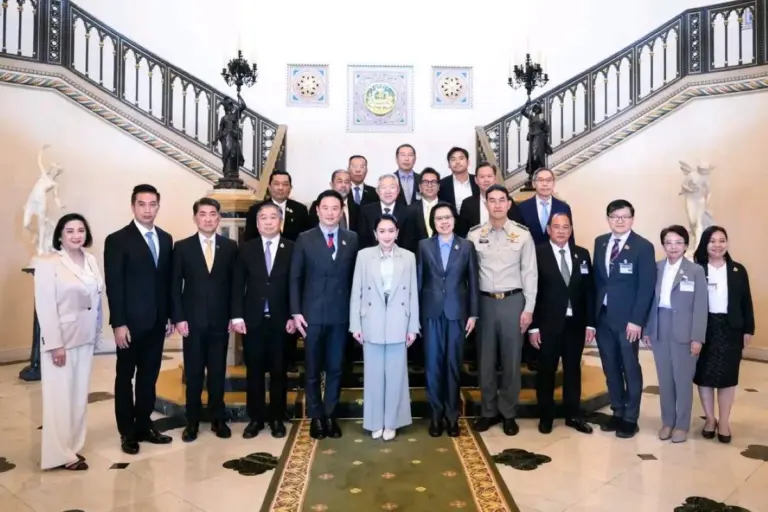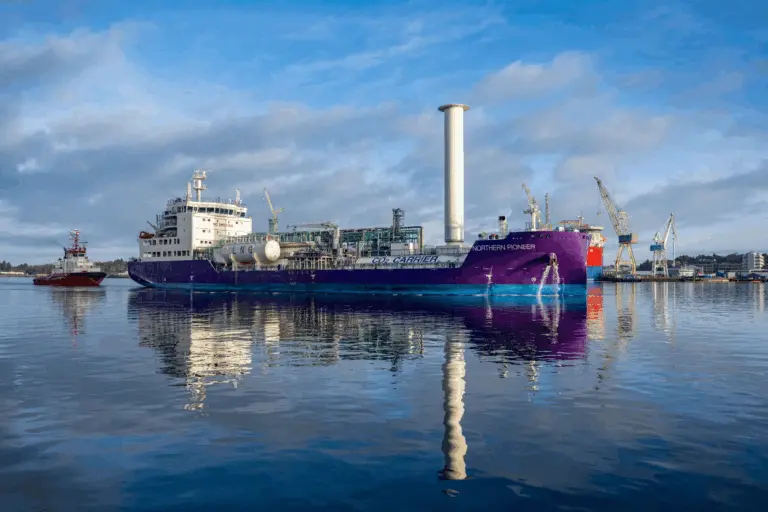ประธานสมาคมธนาคารไทย สนับสนุนแก้ปัญหาเศรษฐกิจนอกระบบ ขับเคลื่อน Green Transition ลดความเหลื่อมล้ำ สร้างโอกาส SMEs เติบโตยั่งยืน
นายผยง ศรีวณิช กรรมการผู้จัดการใหญ่ ธนาคารกรุงไทย ในฐานะประธานสมาคมธนาคารไทย ร่วมเวทีสัมมนาวิชาการ “Fiscal GreenPrint พิมพ์เขียวนโยบายการคลังสู่เศรษฐกิจสีเขียว” จัดโดยสำนักงานเศรษฐกิจการคลัง (สศค.) โดยร่วมเสวนากับผู้บริหารองค์กรภาครัฐและเอกชนในหัวข้อ “Fiscal GreenPrint: Bridging Policy and Practice เชื่อมนโยบายสู่การปฏิบัติ” โดยระบุว่า การขับเคลื่อนการเปลี่ยนผ่านไปสู่เศรษฐกิจสีเขียว หรือ Green Transition ให้มีประสิทธิภาพ ต้องคำนึงถึงบริบทเศรษฐกิจไทยในปัจจุบันที่กำลังเผชิญปัญหา เศรษฐกิจนอกระบบที่มีขนาดใหญ่เกือบ 50% ของ GDP
ความใหญ่ของเศรษฐกิจนอกระบบนั้น นำมาสู่ความท้าทายในหลายด้าน เช่น รายได้ของประเทศและความสามารถในการแข่งขันอยู่ในระดับต่ำ ปัญหาความยากจนและความเหลื่อมล้ำสูง โดยเฉพาะความเหลื่อมล้ำระหว่างรายใหญ่กับรายเล็ก ทำให้การรับมือกับการเปลี่ยนแปลงทางสภาพภูมิอากาศ (Climate Impact) ทำได้ยากมากยิ่งขึ้น สอดคล้องกับข้อมูล World Bank และ IMF ที่ชี้ว่าประเทศที่มีเศรษฐกิจนอกระบบขนาดใหญ่มีแนวโน้มในการรับมือกับ Climate Risk ด้อยกว่าประเทศที่มีเศรษฐกิจนอกระบบขนาดเล็ก ดังนั้นการเร่งแก้ปัญหาเศรษฐกิจนอกระบบ จึงเป็นรากฐานที่สำคัญในการขับเคลื่อนสู่ Green Transition เพื่อยกระดับเศรษฐกิจไทย
“ประเทศไทยจัดอยู่ในกลุ่มที่มี Climate Risk สูง พร้อมๆกับมีเศรษฐกิจนอกระบบขนาดใหญ่ ทำให้มีความเสี่ยง และความเปราะบางในการรับมือกับ Climate Risk สูงกว่าประเทศอื่นๆในภูมิภาค ดังนั้นปัญหาเศรษฐกิจนอกระบบจึงเป็นเรื่องเร่งด่วนในการจัดการ เพราะหากสามารถแก้ไขปัญหาเศรษฐกิจนอกระบบจะทำให้ไทยมีฐานที่แข็งแรงในการเปลี่ยนผ่านไปสู่ Green Transition ได้อย่างมีประสิทธิภาพ”
ทั้งนี้ อยากให้ประเทศไทยมองเรื่อง Green Transition เป็นโจทย์เดียวกันกับโอกาสในการยกระดับเศรษฐกิจของประเทศ และแก้ปัญหาเชิงโครงสร้างที่เกี่ยวเนื่องกันไปในคราวเดียว โดยเฉพาะผ่านการเพิ่มการลงทุนใหม่ๆ ในระยะ 10 ปีที่ผ่านมาการลงทุนภาคเอกชนของไทยอยู่ในระดับต่ำมายาวนาน นับตั้งแต่วิกฤติ 40 (ค่าเฉลี่ยปี 2533-2539 อยู่ที่ 41%) และคิดเป็นสัดส่วนเพียง 25% ของ GDP ต่ำกว่าหลายประเทศในเอเชีย โดยทาง Bain & Company ประเมินว่าภายในปี 2573 จะมีการลงทุนสีเขียว (Green Investment) ในภูมิภาค ASEAN ราว 1.5 ล้านล้านดอลลาร์สหรัฐฯ
สำหรับประเทศไทยประเมินว่ามีความจำเป็นต้องมีการลงทุนสีเขียวมากถึง 1.8 แสนล้านดอลลาร์สหรัฐฯ ในช่วงเวลาเดียวกัน ซึ่งจะก่อให้เกิดโอกาสในการยกระดับรายได้และการจ้างงานของประชาชน จากความต้องการ Green Job ที่เพิ่มสูงขึ้น และยังจะยกระดับขีดความสามารถในการแข่งขันในยุค Future Economy อีกด้วย
นายผยงกล่าวว่า สมาคมธนาคารไทยให้ความสำคัญกับ Green Transition โดยยกระดับประเด็น Sustainability เป็น 1 ใน 4 ยุทธศาสตร์สำคัญที่จะร่วมกันผลักดัน โดยที่ในปีนี้ ธนาคารพาณิชย์ 8 แห่ง ร่วมผลักดันโครงการ Financing the Transition เพื่อสนับสนุนผลิตภัณฑ์และบริการทางการเงิน ที่ช่วยให้ภาคธุรกิจปรับตัวสู่ความยั่งยืนด้านสิ่งแวดล้อม ต่อยอดจากในปี 2566 ที่ธนาคารขนาดใหญ่ให้สินเชื่อเปลี่ยนผ่านเพื่อความยั่งยืนหรือ Transition Finance เกือบ 2 แสนล้านบาท หรือ 1.4% ของยอดคงค้างสินเชื่อรวม
นอกจากนี้ สมาคมธนาคารไทย ยังได้บรรจุเรื่อง Green Economy อยู่ในข้อเสนอที่ได้นำเสนอต่อรัฐบาล เพื่อพิจารณาเป็นแนวทางในการแก้ไขปัญหาเศรษฐกิจของประเทศ โดยเสนอให้เพิ่มศักยภาพในการแข่งขันให้กับผู้ประกอบการ ด้วยการสนับสนุน Tax Incentive สำหรับ Transition Finance รวมถึงการลงทุนที่เกี่ยวกับ Green โดยมองว่าการมี Incentive ที่เหมาะสมให้กับผู้ประกอบการ โดยเฉพาะในกลุ่ม SMEs ในการปรับตัว จะมีส่วนสนับสนุนให้ผู้ประกอบการเข้าถึงแหล่งเงินทุนได้มากขึ้น
“ข้อมูล หรือ Data คือ สิ่งสำคัญในการขับเคลื่อน Green Transition เพื่อให้สามารถเข้าใจปัญหาหรือสถานการณ์ที่แท้จริง นำไปสู่การตัดสินใจ ขับเคลื่อนเศรษฐกิจโดยอาศัยข้อมูล (Data-Driven Economy) เปิดกว้าง โปร่งใส เชิญชวนให้ทุกฝ่ายเข้ามามีส่วนร่วม ซึ่งปัจจุบัน พบว่าข้อมูลเกี่ยวกับ Climate Risk และ Green Economy ยังมีข้อจำกัดอยู่มาก ทั้งในเรื่องระบบจัดเก็บและความน่าเชื่อถือของข้อมูล โดยเฉพาะข้อมูลของธุรกิจ SMEs และก๊าซเรือนกระจกใน Scope 3 ซึ่งทำให้การก้าวสู่ Net Zero Supply Chain เป็นไปได้ยาก รวมถึงการมี Verifier และมาตรฐานสำหรับ Carbon Credit ที่ตอบโจทย์ทั้งบริบทในประเทศและบริบทระหว่างประเทศ เพราะ Carbon Credit เป็น Global Asset Class ประเภทหนึ่ง” นายผยงกล่าว
นอกจากนี้การขับเคลื่อนเรื่อง Green Economy ทุกภาคส่วนต้องร่วมมือกัน และต้องไม่ทิ้งใครไว้ข้างหลัง เพื่อให้ Green Transition เป็น Inclusive Transition นำโดยภาครัฐที่ออกแบบและขับเคลื่อนนโยบายรวมทั้งสร้างแรงจูงใจด้วยเครื่องมือทางนโยบายทั้งด้านการเงินและด้านสภาพแวดล้อม (Operating Environment) ที่สนับสนุนให้เกิดการปรับตัวในทุกภาคส่วน ในแต่ละ Ecosystem อย่างสมดุล เช่น มาตรการทางด้านภาษี สินเชื่อดอกเบี้ยต่ำ (Soft Loan) รวมไปถึงการจัดซื้อจัดจ้างของรัฐที่เพิ่มแต้มต่อให้กับสินค้าไทยที่ได้มาตรฐานด้านสิ่งแวดล้อม ด้านผู้ประกอบการรายใหญ่ โดยเฉพาะบริษัทที่จดทะเบียนในตลาดหลักทรัพย์ ควรต้องร่วมมีบทบาทยกระดับ SMEs ที่อยู่ใน Supply Chain เดียวกัน ถือเป็นส่วนหนึ่งของ Corporate Responsibility ขณะที่ภาคประชาชน รวมถึงธุรกิจรายย่อย ควรต้องเข้ามาอยู่ในระบบมากขึ้น อีกทั้งเพิ่มความตระหนักรู้ และปรับตัวเพื่อ Up-skill/Re-skill สอดรับโอกาสจาก Green หรือ Transition Job และได้รับค่าจ้างที่สูงขึ้น (Pay by Skill)
“ภาคการเงิน เป็นเพียงหนึ่งในหลายๆฟันเฟืองที่จะร่วมขับเคลื่อน Green Transition ยังต้องมีความร่วมมือจากทุกภาคส่วนทั้งภาครัฐและเอกชนในแต่ละกลุ่มอุตสาหกรรม เพื่อให้การขับเคลื่อนมีประสิทธิภาพ ซึ่งนโยบายของภาครัฐที่ตรงจุด และในเวลาที่เหมาะสม จะเป็นปัจจัยที่สนับสนุนให้ผู้ประกอบการทุกภาคส่วน โดยเฉพาะ SMEs เข้าสู่ Green Transition ขับเคลื่อนประเทศสู่ Green Economy อย่างยั่งยืน โดยมีความสมดุลระหว่างการลด Carbon Emission กับการส่งผ่าน Incentive เพื่อให้ชุมชนและภาคครัวเรือนมีคุณภาพชีวิตที่ดีขึ้นไปพร้อมๆ กัน” นายผยงกล่าว
……

นายผยง ศรีวณิช กรรมการผู้จัดการใหญ่ ธนาคารกรุงไทย ในฐานะประธานสมาคมธนาคารไทย
Thai Bankers’ Association Advocates for Addressing Informal Economy to Drive Green Transition, Reduce Inequality, and Create Opportunities for Sustainable SME Growth
In a recent seminar organized by the Fiscal Policy Office (FPO), Payong Srivanich, CEO of Krungthai Bank and Chairman of the Thai Bankers’ Association, emphasized the urgent need to address the informal economy to drive Thailand’s transition to a green economy. The discussion, part of the “Fiscal GreenPrint: Bridging Policy and Practice” panel, highlighted the challenges posed by the large informal economy, which accounts for nearly 50% of the nation’s GDP.
A large informal economy leads to numerous challenges, including low national income, reduced competitiveness, poverty, and high inequality, particularly between large and small businesses. These challenges make it more difficult to address climate impacts, aligning with the World Bank’s and the IMF’s data that countries with large informal economies are less capable of managing climate risks. Therefore, resolving informal economy issues is seen as essential for establishing a strong foundation for Thailand’s green transition.
“Thailand is classified as a country with high climate risk. This, coupled with the country’s large informal economy, makes Thailand more vulnerable compared to other countries in the region. Therefore, addressing the informal economy is a priority because solving this issue will provide Thailand with a strong foundation for effective green transition.”
Thailand should view the green transition as an opportunity to elevate the country’s economy, solving related structural problems in one go, particularly through new investments. Over the past decade, private investment in Thailand has remained low; averaging only 25% of GDP, significantly lower than the 41% of GDP observed during the period prior to the Asian Financial Crisis and below many Asian countries. Bain & Company estimated that by 2030, green investments in the ASEAN region will reach approximately $1.5 trillion, with Thailand requiring up to $180 billion in green investments during this period. This presents an opportunity to raise income and employment levels due to the increasing demand for green jobs and to boost competitiveness in the future economy.
Payong noted that The Thai Bankers’ Association has made green transition a priority, incorporating sustainability as one of its four key strategies. This year, eight commercial banks joined forces to promote the “Financing the Transition” project, continuing last year’s efforts of nearly 200 billion baht in transition finance, equivalent to 1.4% of total outstanding loans. Additionally, the Thai Bankers’ Association has included the Green Economy in its proposals to the government as a guideline for addressing the country’s economic problems. The Association has proposed enhancing the competitiveness of businesses by supporting Tax Incentives for Transition Finance and Green-related investments. By providing appropriate incentives to businesses, especially SMEs, they can better adapt and gain better access to funding sources.
“Data is crucial in driving the green transition as it enables understanding of real problems or situations, leading to a data-driven economy. It should also be transparent and open to all. Currently, data related to climate risk and green economy has limitations, both in terms of data collection and reliability, especially for SMEs and Scope 3 greenhouse gas emissions data. Additionally, there is a need for verifiers and carbon credit standards that align with national and international contexts because carbon credit is a global asset class.”
He emphasized that driving the green economy requires cooperation from all sectors, ensuring that no one is left behind for this green transition to be an inclusive transition. The government is a lighthouse by implementing policies and creating incentives through financial measures and operating environment, such as tax incentives, soft loans, and government procurement advantages for Thai products that meet environmental standards. Large enterprises, particularly listed companies, should play a role in elevating SMEs in their supply chain as part of their corporate responsibility. The public at large and small businesses should formalize, increase awareness, and adapt through upskilling and reskilling to align with green job opportunities to receive higher pay based on skills.
“The financial sector is just one of many gears that will help drive green transition. Effective implementation requires cooperation from all sectors, both public and private. Timely and rightly targeted government policies will support businesses of all sectors, especially SMEs, in entering the green transition and drive the country towards a sustainable green economy with a balance between reducing carbon emissions and passing on incentives to ensure better quality of life for communities and households.”








